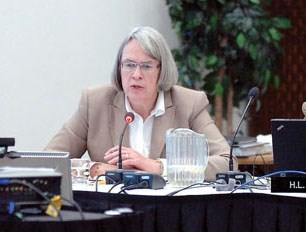By the end of 2013 the National Energy Board is expected to make its recommendation to the federal cabinet whether the Northern Gateway pipeline project should proceed - but that doesn't mean the fight will be over.
After more than three years, which has seen thousands of pages of evidence presented by all sides and hearings taking place in communities along the proposed route, the regulatory process into the $6.5 billion project to connect Alberta's oilsands with Kitimat will conclude. If the Joint Review Panel (JRP) gives a positive recommendation or if cabinet gives the project a certificate to proceed, some pipeline opponents plan to continue their fight through the court system.
"We've already seen so many court cases that are in favour of aboriginal rights and title," Carrier Sekani Tribal Council chief Terry Teegee said earlier this year.
His group has boycotted the JRP process, but expects lawsuits challenging the project could last up to a decade. The legal wrangling has the possibility of either delaying the construction of the pipeline or halting it all together.
Since much of the area the pipeline plans to cross is not covered by treaties, Aboriginal groups are expected to argue they weren't adequately consulted and the pipeline has the potential to create irreversible changes to areas of the environment they traditionally rely upon.
Before any possible lawsuits will be filed, the JRP has to finish up its work and it has a busy year ahead.
First up for the three-member panel are trips to Victoria, Vancouver and Kelowna for community hearings sessions in January. These meetings have already been held in communities close to the proposed right of way this past spring and summer and give interested citizens an opportunity to give an oral presentation on their opposition or support for the project.
With one day set aside for speakers in Kelowna, seven for Victoria and eight for Vancouver, that phase of the process will take a month to complete. Due to the threat of protests, the panel has ruled members of the public will be excluded from the Vancouver and Victoria sessions.
The show then heads back to Prince Rupert for up to 10 more weeks of cross-examination of evidence already on the record. The panel got through its first week of hearings in the coastal community this month, but still has a long list of topics to tackle ranging from Aboriginal engagement to shipping and navigation.
The final arguments will be heard in June in Terrace. Groups will first submit their arguments in writing in an attempt to sway the opinion of the panel, and then respond to the arguments of other groups orally.
Enbridge vice-president for western access Janet Holder said the argument phase will give all sides the chance to present a concise story on why they're in favour or opposed to the project.
"When you're in the hearing room, you hear lots of facts and lots of information, but it's in the argument where that information and those facts are then used to defend your position, whether you be an opposition intervener, an intervener in support or in our case the proponent of the application," Holder said. "It will be the summary of everything that's transpired over the last year and a few months of evidence."
Panel members Sheila Leggett, Kenneth Bateman and Hans Mathews will then have upwards of six months to go through the thousands of pages of documents filed by the company, experts from all sides, First Nations and concerned citizens and prepare their recommendation to cabinet. By law it must be submitted by Dec. 31, 2013 and the panel has already indicated it doesn't expect to have it ready before Dec. 29, 2013.
Cabinet will have time to review the panel's decision, but is expected to either issue or deny a licence early in 2014.
If that approval is granted and not disrupted by lawsuits, Northern Gateway would then proceed with its detailed engineering planning and its detailed spill response planning, both of which would need to be approved by the National Energy Board.
Holder said the company will be eagerly waiting the final decision, but will still continue working during the interim.
"As much as it would be nice to know what the final decision is, we do feel we need to continually evolve the project, we continually need to receive input, listen to concerns and adapt where we can, so that work will be ongoing," she said.
In the midst of all that, B.C. will also hold a provincial election in 2013, which could have a significant impact on if the project can proceed at all. The NDP, who have led in most public opinion polls since May 2011, have pledged to opt out of the joint review process and launch a provincial environmental review. It's not known how long that will take, nor what jurisdictional issues would pop up as inter-provincial pipelines are a federal responsibility, rather than a provincial one.
NDP environment critic Rob Fleming called Northern Gateway "the most significant project to pose major environmental risks in generations in B.C."
The governing Liberals have listed five conditions which must be met before they'd consider signing off on the project - the most contentious of which is a demand B.C. receive a larger share of the economic benefits. If those conditions aren't met, the Liberals have vowed not to issue the required environmental permits the project would need to proceed.
The Conservatives are the most pipeline friendly of the major parties and have said they will support Northern Gateway if elected.
The provincial Green Party has also promised to halt consideration of the pipeline if they come to power.



